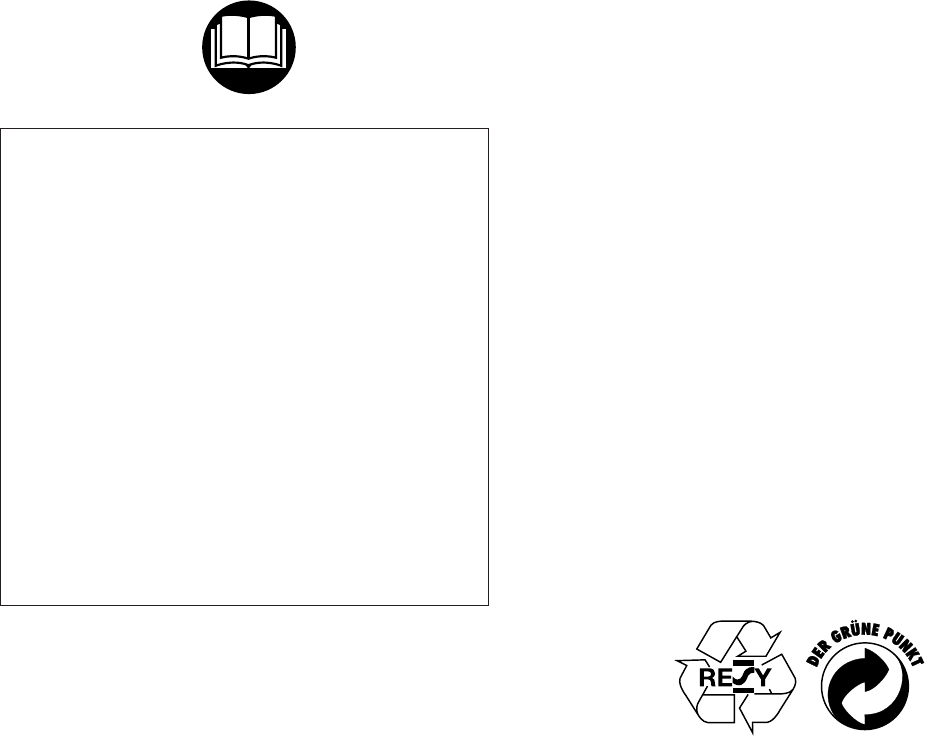
3
Packing
Your DOLMAR Power Cut is packed in a cardboard box to pre-
vent shipping damage.
Cardboard is a basic raw material and is consequently reuseable
or suitable for recycling (waste paper recycling).
Thank you for purchasing a DOLMAR product!
Congratulations on choosing a DOLMAR Power Cut cutoff saw!
We are condent that you will be satised with this modern piece of
equipment. DOLMAR GmbH of Hamburg, Germany is the world’s
oldest manufacturer of gasoline-powered chainsaws - we got our
start in 1927 - giving us very extensive experience with power
hand tools. Like our chain saws, the DOLMAR Power Cuts feature
specially designed high-performance engines with outstanding
power-to-weight ratios, for heavy-duty yet lightweight tools.
Other advantages of the DOLMAR Power Cuts:
• Sturdy construction and high reliability.
• Maintenance-free electronic ignition, hermetically sealed to
protect against dust and moisture.
• Vibration damping with the DOLMAR 2-mass system (D2M) for
tireless working even when guiding the Power Cut by hand.
• Five-stage air-lter system for reliable working even under very
dusty conditions.
• Two options for mounting the cutter attachment: Either cen-
trally, for good balance when guiding the unit manually, or on
the side, for ush cuts along walls or curbsides or horizontally
directly above the ground.
•
Extensive range of resin-bonded and diamond grit cutting discs,
trolley with dust catcher, and systems for supplying water to
the disc.
The following industrial property rights apply: US 08510690,
SE 95027298, SE 95027306, IT 95000653, IT 95000654, GBM
9412558, GBM 9412559.
We want you to be satised with your DOLMAR product.
In order to guarantee the optimal function and performance of
your Power Cut and to ensure your personal safety we would
request you to perform the following:
Read this Instruction and Safety Manual carefully before
putting the Power Cut into operation for the rst time,
and strictly observe the safety regulations! Failure to observe
these precautions can lead to severe injury or death!
Only for PC-7330, 7335: The Emissions Compliance Period
referred to on the emission Compliance label indicates the
number of operating hours for which the engine has been shown
to meet federal emissions requirements.
Category C= 50 hours, B= 125 hours, and A= 300 hours.
Table of contents Page
Packing ................................................................................3
Delivery inventory ..............................................................4
Symbols ...............................................................................4
SAFETY PRECAUTIONS
Intended use ...................................................................5
General precautions .......................................................
5
Protective equipment ...................................................
5-6
Fuels / Refuelling ............................................................
6
Putting into operation ......................................................
6
Cutting discs ...................................................................
7
Kickback and lock-in .......................................................
8
Working behavior / Method of working
............................8
Always observe the following when using
synthetic resin cutting discs .............................................
9
Cutting metal ...................................................................
9
Cutting masonry and concrete ...................................
9-10
Transport and storage ...................................................
10
Maintenance .................................................................
11
First aid .........................................................................
11
Disposal and environmental protection ......................... 11
Technical data ...................................................................12
Denomination of components .........................................13
PUTTING INTO OPERATION
Mounting the cutting disc ...............................................
14
Tightening the V-belt / Checking V-belt tension ............
15
Installing the pressure water system .......................
15-16
Fuels / Refuelling .....................................................
16-17
Starting the engine ........................................................
18
Cold-starting .................................................................
18
Warm-starting ...............................................................
19
Stop engine ...................................................................19
Adjusting the carburetor ..................................................20
MAINTENANCE
Changing the V-belt ......................................................
21
Cleaning the protection hood ........................................
22
Cleaning / changing the air lter ..............................
22-23
Replacing the spark plug ..............................................
24
Replacing the suction head ..........................................
24
Replacing the starter cable ...........................................
25
Replacing the return spring ...........................................
26
Instructions for periodic maintenance ...........................
30
Cutting attachment in central / side position .................27
Repositioning the cutting attachment .......................
27-28
Replacing/cleaning the spark arrester screen ..............
28
SPECIAL ACCESSORIES
Diamond cutting discs, trolley, water tank
and pressure water system ............................................
29
Service, spare parts and guarantee ...........................30-31
Troubleshooting ...............................................................31
Extract from spare parts list .......................................32-33
Accessories ..................................................................33
Service stations (see enclosure)
WARNING!
Some dust created by power sanding sawing, grind-
ing, drilling, and other construction activities contains
chemicals known (to the State of California) to cause
cancer, birth defects or other reproductive harm.
Some examples of these chemicals are:
• lead from lead-based paints,
• crystalline silica from bricks and cement and
other masonry products, and
• arsenic and chromium from chemically
treated lumber.
Your risk from these exposures varies, depending on
how often you do this type of work.
To reduce your exposure to these chemicals: work in
a well ventilated area, and work with approved safety
equipment, such as those dust masks that are specially
designed to lter out microscopic particles.
